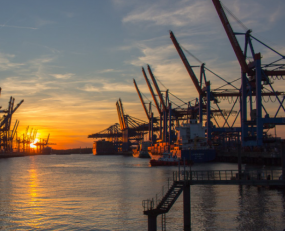
South Africa’s ports and much of its railways are being crippled by strikes. These are essentially about the impact of inflation on worker’s wages. Called by the ‘United National Transport Union’ and the ‘SA Transport and Allied Workers Union’ last week, the strikers are looking for a pay-rise higher than that of South Africa’s 7.6% inflation rate, whilst the state-owned transport organisation, Transnet’s, latest pay offer is 4.5%. Negotiations are volatile with the government making strong appeals for the strikes to end.
Ports in South Africa have not come to a total halt, however bulk terminal volumes are reported to be operating at around 10-20% of capacity whilst container ports are having acute problems with landside transport. There are reports of violence breaking-out between strikers and employees still working.
The strike is the latest problem for Transnet, a state-owned entity that was created by the African Nation Congress government as a means of managing the country’s transportation infrastructure. Over a number of years there have been complaints about its effectiveness and accusations of cronyism. However, it is a key political asset in South Africa, not least due to the number of workers it employs. It is also vital to the wider South African economy with sectors such as mining and agricultural dependent on Transnet services.
One of the problems in terms of dealing with the strikes is that Transnet’s financial situation is fragile and it cannot afford higher wages for its workers. In the words of the employer’s confederation ‘Business Unity South Africa’, “there are no easy solutions on the table here – nor short term fixes – given the financial state of Transnet’s balance sheet, higher levels of inflation, the fiscal constraints and the stresses that business are under in this challenging economic environment”.
The issues of an inadequate infrastructure are central to South Africa’s economic prospects and its recent inability to realise those prospects. The potential for investment by the private sector is logistics is substantial, something which would both an investment opportunity for logistics service providers as well for sectors such as agriculture and mining. What is stopping this is the politics of the situation.
Supply chain strategists can use GSCi – Ti’s online data platform – to identify opportunities for growth, support strategic decisions, help them stay abreast of industry trends and development, as well as understand future impacts on the industry.
Visit GSCi subscription to sign up today or contact: Michael Clover for a free demonstration: [email protected] | +44 (0) 1666 519907
Source: Transport Intelligence, 13th October 2022
Author: Thomas Cullen